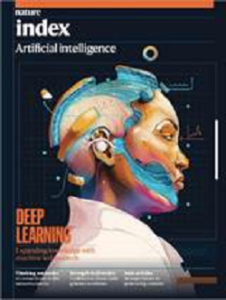
Nature Index Artificial Intelligence (AI) supplement investigates emerging trends in AI research output alongside an experiment in AI-powered curation
Escalating computing power, expanding data sets, and algorithms of unprecedented sophistication have led to a massive increase in the number of journal and conference papers referring to AI in recent years. The Nature Index AI supplement, published today, draws on Nature Index data and the larger Dimensions from Digital Science database to analyse this rapidly advancing and controversial topic. For the first time, the supplement also includes summaries of research articles created using AI, and it looks more broadly at how AI is being used in scholarly publishing.
The Nature Index AI supplement investigates emerging applications of AI such as in detecting deep fakes, drug discovery, and recognising bias in facial recognition. Through the profiles of six researchers, the supplement also includes insights into the people behind advances in astronomy, education and healthcare research powered by AI.
In terms of institutions that publish the most AI-related papers in the high-quality natural-science journals tracked by the Nature Index, three US institutions appear at the top: Harvard University, Stanford University and MIT. In the much larger Dimensions from Digital Science database, which encompasses AI technology development, institutions in China dominate with Tsinghua University number one. Countries with a strong record of AI research: the US, UK and Germany, come in just ahead of China, according to the Nature Index, but in Dimensions China now leads. An infographic also outlines the strongest, most productive collaborations on AI-related papers according to the Nature Index.
The supplement also looks at how AI can be applied in the context of scientific publishing, for example, to create text from structured datasets, to summarise papers, allow readers to more easily find relevant papers, and even identify possible alternative destinations for papers that have been rejected from journals. The Nature Index AI supplement includes an experiment in auto-summarisation. Different AI generated summaries of research articles published by Springer Nature are included.
David Swinbanks, Founder of the Nature Index, said: “As one of the most rapidly advancing and controversial topics in research, AI pertains to many aspects of our lives. The Nature Index AI supplement outlines some of the key trends and applications in research. It highlights that top Western institutions dominate in the use of AI in natural science research tracked by the index, while China dominates the applied research in the broad Dimensions database. As AI research output continues to increase, we hope that this supplement can draw attention to some of these advances, but also the ethical and technical challenges that lie ahead. Of particular note is the way that AI is now being used in the scientific publishing industry, where there is much scope to improve the way researchers find and digest content using the power of AI.”



















